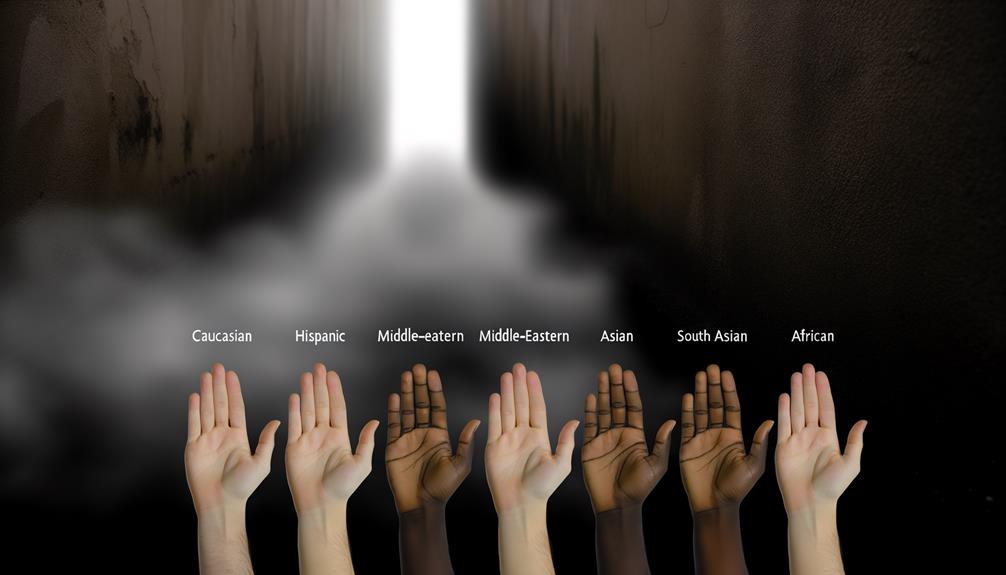Grace in the Bible reveals unearned love from God to humanity, uncovering profound truths about divine relationships and…

Unmerited Favor in the Bible
You might not be aware that the concept of unmerited favor, or grace, is woven throughout the entire narrative of the Bible, not just in the New Testament as is commonly thought. This foundational principle underscores every interaction between the divine and the human, offering insights into the character of God and His dealings with humanity.
From the Old Testament's stories of redemption and covenant to the New Testament's revelations of salvation and forgiveness, grace is the thread that binds these narratives together. As we explore this theme, you'll discover its profound implications on how we understand our relationship with the divine and with each other.
Key Takeaways
- Unmerited favor, or grace, is central to Christian salvation, challenging merit-based reward systems.
- Biblical figures like Noah and Abraham exemplify God's grace, highlighting its availability to all.
- Jesus' teachings and actions underscore grace as a transformative force for personal and societal change.
- Living in grace involves practicing kindness, forgiveness, and empathy, offering strength and hope in adversity.
Defining Unmerited Favor

Unmerited favor, often encapsulated in the concept of grace, is a foundational principle in Christian theology, denoting a gift from God that humans can't earn through their actions. This concept rests at the heart of the Christian understanding of salvation and divine benevolence. To grasp the depth of unmerited favor, you must delve into its origins and the dynamics of favor that underscore its significance.
Grace origins trace back to the earliest Christian texts, where it's presented as a cornerstone of faith. The term itself, derived from the Greek word 'charis,' embodies the idea of a gift that's freely given, regardless of the worthiness of its recipient. This notion challenges human logic, which often operates on merit-based systems of reward and punishment. The radical nature of grace, therefore, lies in its defiance of such systems, offering love and forgiveness without prerequisite.
The dynamics of favor within this context are complex and multifaceted. They reveal a divine intentionality to bridge the gap between the divine and the human, to reconcile and restore. Grace, in this light, isn't merely a theological concept but an active force that transforms lives. It operates beyond human merit, making salvation accessible to all, irrespective of their past actions or present moral standing.
Understanding unmerited favor demands a recognition of its inherent paradox: it's both simple in its offer and profound in its implications. As you reflect on grace origins and favor dynamics, you're invited to explore a principle that's as challenging as it's comforting, promising a love that surpasses human understanding and a gift that demands nothing in return.
Old Testament Examples

Exploring the Old Testament, we find numerous instances where God's unmerited favor is vividly demonstrated, setting the stage for understanding this concept's deep roots in biblical history. These examples not only illustrate the generosity of God's grace but also underscore the recurring theme of divine preference that transcends human merit or achievements.
One of the most compelling illustrations of unmerited favor is:
- Noah's selection: Amid widespread corruption, Noah found favor in the eyes of the Lord (Genesis 6:8). His selection to build the ark and preserve the sanctity of life wasn't attributed to his righteousness alone but underscored the unmerited favor of God towards him and his family. This pivotal moment highlights how divine grace operates beyond human qualifications, choosing Noah as an instrument of salvation.
Other significant instances include:
- Abraham's covenant: God's promise to Abraham is a foundational example of unmerited favor. Despite Abraham's uncertainties and imperfections, God chose him to father a nation through which all peoples on earth would be blessed (Genesis 12:1-3). This covenant, established not on the basis of Abraham's deeds but on God's gracious choice, underscores the unconditional nature of divine favor.
- Joseph's rise to power: Joseph's journey from the pit to the palace exemplifies unmerited favor. His meteoric rise in Egypt, culminating in his appointment as Pharaoh's second-in-command, was a direct result of God's favor on his life, positioning him to save many during a time of famine.
These Old Testament examples vividly demonstrate how God's unmerited favor is integral to His relationship with humanity, providing a foundation for understanding the depths of His grace throughout biblical history.
New Testament Insights

Transitioning to the New Testament, we observe a profound expansion of God's unmerited favor through the life, teachings, and redemptive work of Jesus Christ. This era marks a significant shift, emphasizing that salvation and God's grace aren't restricted by ethnic or cultural boundaries. Gentile inclusion becomes a pivotal theme, illustrating the universal scope of God's grace. This is particularly evident in the Acts of the Apostles and the Pauline Epistles, where the message of Jesus is actively spread among the Gentile populations, breaking the traditional Jewish confines.
Parable interpretations further underscore this theme of unmerited favor. Take, for instance, the Parable of the Prodigal Son. Here, Jesus narrates the story of a father's unconditional love and forgiveness towards his wayward son, despite the son's unworthy actions. This parable, among others, serves as a metaphor for God's boundless grace towards humanity, highlighting that redemption is freely offered to all who turn back to Him, irrespective of their past.
Moreover, the Beatitudes, as presented in the Sermon on the Mount, reveal blessings for those in seemingly unfavorable circumstances, suggesting that God's favor doesn't align with worldly standards of merit or success. Jesus' teachings and interactions often challenge societal norms, extending kindness and forgiveness to tax collectors, sinners, and outcasts, thereby embodying the essence of divine grace.
In essence, the New Testament insights into unmerited favor reveal a God who's deeply invested in the redemption of all people, transcending cultural, societal, and religious barriers to extend His grace and love universally.
Misconceptions and Clarifications

While it's clear that the concept of unmerited favor is central to the New Testament, there are several misconceptions that cloud its understanding and application. These misunderstandings often lead to skewed perceptions of God's grace, impacting how you live out your faith. It's crucial to address and clarify these points to ensure a more accurate interpretation of biblical teachings.
- Misconception: Unmerited favor means earned righteousness is possible. The idea of grace contradicts the notion that you can earn your way into God's favor. Unmerited favor, by definition, can't be earned through deeds or moral behavior. This is a fundamental misunderstanding that shifts focus from God's generosity to human efforts, undermining the essence of grace.
- Misconception: Grace eliminates the need for obedience. Some interpret grace as a license to live without regard for God's commands, misapplying Paul's teachings on freedom in Christ. However, this overlooks the New Testament's emphasis on a transformed life that naturally flows from gratitude for God's grace, not as a means to attain it.
- Misconception: Legalistic interpretations are compatible with grace. Legalism, or the strict adherence to certain laws or rituals as a means to gain favor with God, is directly at odds with the concept of unmerited favor. Legalistic interpretations fail to recognize grace as a free gift and instead promote a transactional relationship with God, which is contrary to the Gospel message.
Clarifying these misconceptions is essential for a faithful understanding and application of unmerited favor in your spiritual walk. Remember, grace isn't about what you do, but what's been done for you.
Living in Grace Today

In today's world, living under the canopy of grace offers both a profound challenge and a transformative opportunity for believers. You navigate a landscape where societal values often conflict with Biblical principles, yet this very tension underscores the significance of grace practices in your daily life. Engaging in these practices isn't merely about adhering to religious rituals; it's about embodying the essence of grace in your interactions, decisions, and worldview.
Modern testimonies abound, illustrating how believers today are harnessing the power of grace to navigate complex personal and societal challenges. These stories serve as vivid reminders that grace isn't an abstract theological concept but a tangible force that can profoundly impact your life and the lives of those around you. By studying and reflecting on these testimonies, you gain valuable insights into how grace can be lived out in practical, impactful ways.
At its core, living in grace today involves a dynamic process of receiving God's unmerited favor and extending it to others. This requires a heart posture of humility and a willingness to confront your own imperfections. It means forgiving as you have been forgiven and loving as you have been loved, without condition or reservation.
Through the disciplined practice of grace, you're invited into a deeper relationship with God and a more authentic engagement with the world. This journey isn't easy, but it's marked by growth, healing, and an ever-expanding capacity to reflect God's love. In embracing grace, you become a beacon of hope and a testament to the transformative power of God's unmerited favor in a world that desperately needs it.
Frequently Asked Questions
How Do Different Denominations Interpret the Concept of Unmerited Favor?
When exploring how denominations interpret grace, you'll find varied definitions and practices. Some view it as a divine help bestowed without merit, reflecting diverse theological frameworks.
Others emphasize the transformative aspect, linking it to faith and deeds within their denominational practices.
This divergence highlights the rich tapestry of beliefs surrounding grace, encouraging a deeper understanding and appreciation of its role across different faith communities.
In What Ways Has the Idea of Unmerited Favor Influenced Christian Art and Literature Throughout History?
You've seen it in Gothic cathedrals and Renaissance paintings, where the grandeur of art and the humility of grace collide. This juxtaposition isn't random; it's a testament to how deeply the idea of grace, without earning it, has seeped into Christian art and literature.
From stained glass stories to penned parables, artists and writers have explored and expressed this concept, weaving a rich tapestry that reflects a profound theological truth throughout history.
Can the Concept of Unmerited Favor Be Found in Religions Outside of Christianity, and if So, How Is It Portrayed?
Absolutely, you'll find the concept of unmerited favor in other religions, though it might be framed differently. Take Divine Mercy in Islam or Hinduism's karma contrast, for example. These beliefs highlight grace or mercy that's not necessarily earned, mirroring Christian interpretations but within their unique contexts.
Analyzing these parallels offers rich insights into how diverse faiths understand and portray the transformative power of compassion and mercy beyond mere human actions or deservings.
How Do Modern Theologians Critique or Expand Upon Traditional Views of Unmerited Favor?
You're exploring how modern theologians critique or expand upon traditional views, delving deep into grace theology and favor dynamics.
They analyze, dissect, and rebuild concepts, often challenging or verifying age-old interpretations.
In their scholarly journey, faithful to the core, they question and refine our understanding of grace.
Their analyses offer fresh perspectives, ensuring the discourse remains vibrant and relevant, pushing the boundaries of conventional wisdom while staying rooted in foundational beliefs.
What Role Does Unmerited Favor Play in Interfaith Dialogues and Understandings of Salvation Across Different Religions?
In interfaith dialogues, you'll find that unmerited favor plays a crucial role in understanding salvation's diversity across different religions.
It's not just about comparing beliefs; it's about respecting and learning from the rich tapestry of interfaith ethics.
This concept encourages a deeper, more scholarly and faithful exploration of how various traditions approach the idea of salvation, inviting a broader appreciation and mutual respect among diverse religious communities.
Conclusion
So, you've waded through the theological jungle and emerged, hopefully, with a lighter backpack, realizing that unmerited favor—God's grace—isn't about acing a cosmic exam without studying.
Think of it as getting an all-access pass to the best concert ever, despite your playlist being full of questionable tunes. Old Testament heroes stumbled in style, New Testament folks basked in the divine glow, and here we are, trying to dance in the light without tripping over our own feet.
Living in grace today means recognizing we're in the band, not just the audience, playing a symphony scripted in the stars, directed by the divine, and somehow, it still sounds heavenly, even when we hit the wrong notes.



Sign up